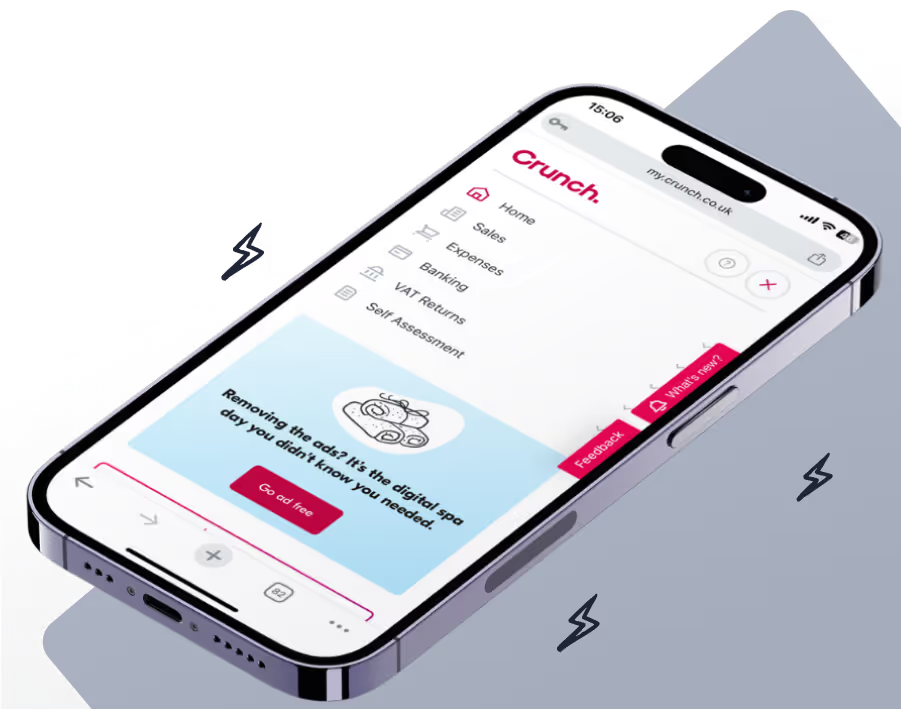
Sole Trader accounting that makes your money go further
Say goodbye to tax panic and hello to more money in your pocket. We will keep your accounts accurate, your tax efficient, and your stress levels low. So you always know exactly where you stand with HMRC. Experience total peace of mind, with accounting done the Crunch way.
Try Crunch Your Way for 14 DaysOur Accreditations Your Peace of Mind







Our Services
Running a business or side hustle and feeling overwhelmed? Our Sole Trader accounting package is here to save the day. Packed with everything you need and more, you can finally wave goodbye to accounting worries for good.

Self Assessments Included as standard
Create and send invoices on the go.
Expense Management
Say goodbye to inputting data manually.
Save time with simple automations
Automate expenses, invoices, and more. Your time is too precious to spend hours on admin, let us do the heavy lifting
No more Tax surprises
Get personal tax estimates based on your actual business performance, so you’re always in control.
Software built for you
Unlike competitors, you won’t need an accounting degree to find your way around our software
Making Tax Digital
We’ll be ready for Making Tax Digital Income Tax Self Assessment (MTD ITSA), so you won’t have to face it alone.
%201.png)
The Crunch difference: expertise, support, savings.

At Crunch, we combine expert Sole Trader accountants with simple, smart technology. Here’s why our Sole Trader accounting package stands out:
Meet your Sole Trader company accounting team
Our ACCA-accredited experts live and breathe Sole Trader accounting. They take care of the tricky stuff, give clear answers when you need them, and help you keep more of your hard-earned money.
With a team of over 100 experts, we’re always on hand. Whether it’s answering a tax question or showing you how to get the most from our software, we’re just a call or a click away.



Book a call today with our friendly experts
Pricing plan
We believe everyone should have expert accountants at their fingertips, plus easy-to-use accounting software that keeps everything in one place.
Helping Sole-traders since 2009
We really are the experts.
ACCA & AAT qualified accountants
Our expert accountants follow the bylaws, regulations, and ethical guidelines of the ACCA.
Save time and money, we file on your behalf
We ask you a few questions to prepare all of the information for HMRC and then get filing.
Sole Trader Pro

Save big when using Crunch
Why pay separately for software, Sole Trader accountants, and Self Assessment when Crunch gives you all three for less? Our award-winning software and expert support save you time, cut stress, and put hundreds of pounds back in your pocket.
Crunch keeps your profits in your pocket. While others just add to your expenses, we help you keep more of what you earn by proactively finding savings others miss. Accounting should save you money, not drain your profits.




How Crunch helps Ioana balance work and life
Ioana traded lecturing for digital marketing consultancy, and Crunch gave her the support and flexibility to manage her finances, so she could focus on what matters most.

Helpful Sole Trader resources
Looking for sole trader advice and guidance before paying for our service? We've got you covered.
Frequently asked questions
Explore our FAQs for quick answers to your questions
If you’re self-employed and running your own business as an individual, then you should be registered with HMRC as a sole trader. Being a sole trader means there’s no legal distinction between the individual and the business they own.Sole traders work in many industries and trades, including electricians, plumbers, management consultants, designers, and more. Check out our article on “What is a sole trader?” for more information.
Self Assessment - often referred to as a ‘tax return’ - is a way for HMRC to calculate how much Income Tax and National Insurance Contributions you’ll need to pay. For contracted employees, your tax is deducted monthly on your employment income through the PAYE system. For the self-employed, or someone with other types of income (e.g. pension or dividends), HMRC needs a Self Assessment to assess the tax required to be paid.
AnswerThere’s no legal requirement for Sole Traders to have an accountant, but having one can make managing your business finances much easier. Accountants can help with statutory filings, tax returns, and financial management, especially when it comes to VAT, CIS, or employing others. With Making Tax Digital (MTD) now in effect, having an accountant can also help ensure your business stays compliant with HMRC’s ever-changing digital tax filing requirements. Crunch’s Sole Trader accounting software is backed by a team of Chartered Certified accountants who can handle all your tax needs, including MTD, so you can focus on running your business.
It’s not a legal requirement, but having a separate business account makes tracking expenses and completing your Self Assessment much easier. With Crunch, you can also link your business bank account via Open Banking for daily automatic imports. If you’re looking for a business bank account, our bank partner Zempler is a great choice. You can apply in minutes and even get £50 when you join through Crunch (as long as you deposit £250 in the first 30 days).
Many major banks don’t give you the option to open an account for your small business online, but usually, you’ll be able to start your application on the bank’s website, prior to meeting a representative in person or over the phone.Some banks will allow you to walk into the branch and make a same-day appointment, but of course, this cannot always be guaranteed.Crunch is also partnered with a number of trusted banks, including Tide, Metro, Barclays, and Revolut. You can even enjoy special offers and discounts when you open a business account through one of these providers as a Crunch client!
Sole trader taxes need to be filed with HMRC before their relevant due dates. You’ll need to start by registering as a sole trader with HMRC, and registering for tax returns such as Self Assessment. As a Crunch client, our team of Chartered Certified accountants can file your tax returns on your behalf. If you don’t have an accountant, though, you’ll need to file your returns yourself.
At Crunch, our paid accountancy package for sole traders is available for just £21.60 pm+VAT! As a Crunch client, you’ll get access to a team of Chartered Certified accountants and expert client managers, available whenever you need them to help your business thrive.
Tax returns sole traders are required to file include VAT (if your business is VAT registered), and your annual Self Assessment, which covers your personal Income Tax and National Insurance liabilities. You can read more about your tax obligations in our “What is a sole trader?” article.
You can prepare your own sole trader accounts if you’d like, but the best strategy is to get an accountant to do it for you. Accountants can make sure your returns are filed accurately and well ahead of a deadline - all you need to do is sign them off! An accountant will also make sure you are claiming the correct business expenses.
As a Sole Trader, you’ll pay Income Tax and National Insurance Contributions based on your business profits. You take personal drawings from the business, and it's important to keep a record of them for tax purposes. Accounting software for Sole Traders like Crunch can help you track your drawings, making sure you’re ready when it’s time to file your Self Assessment.
You can claim expenses for your businesses accountancy fees, providing the accountant's time is being spent working on your sole trader accounts and not on personal items, such as the production of your annual Self Assessment.
Sole traders don’t need to register with Companies House, so no information about your business will appear in their records or on their website.
It’s unlikely your Sole Trader business will need an audit unless your turnover reaches millions of pounds. If that happens, an accountant will need to guide you through any audit requirements.
Your annual Self Assessment must be filed with HMRC before 31st January each year.
Yes, you will receive a Self Assessment for the trading year 2024-2025.

.svg)


